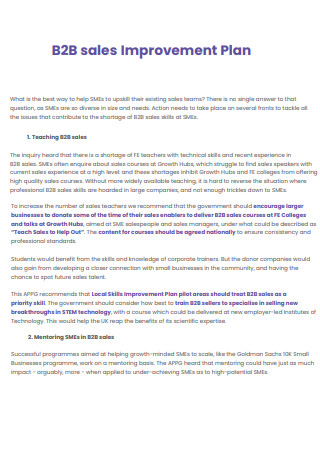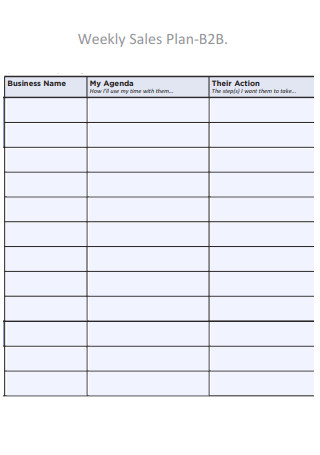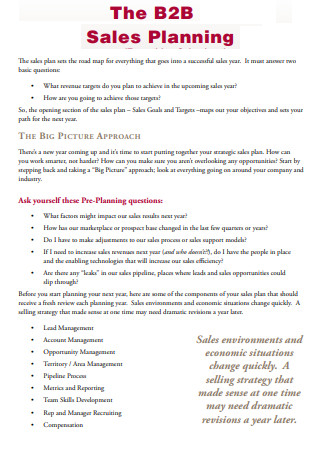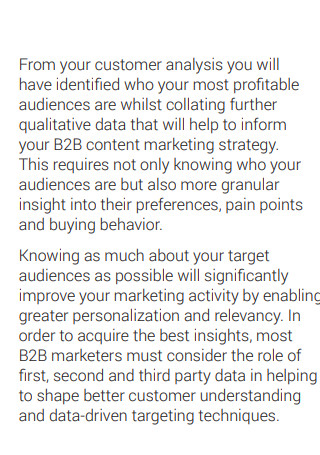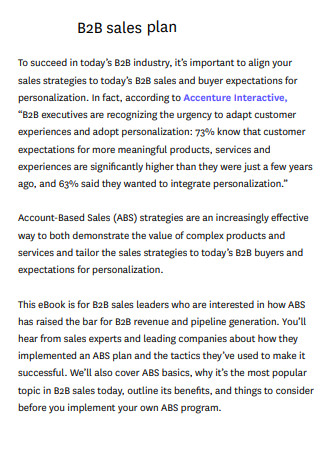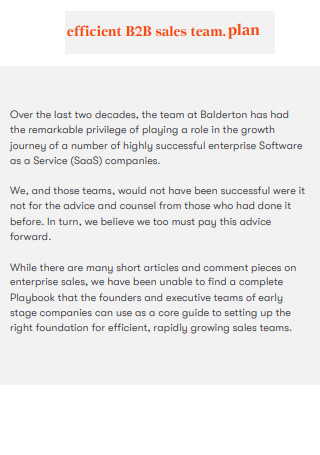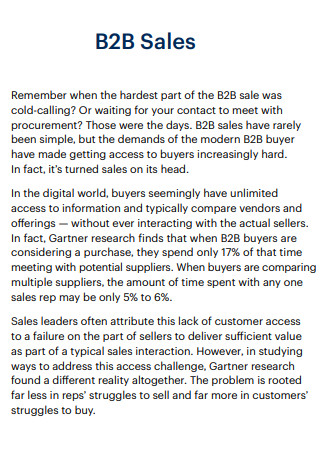7+ SAMPLE B2B Sales Plan
What Is a B2B Sales?
B2B sales is a marketing term that refers to any strategy or content targeted at a business or organization. Typically, any company or organization that sells products or services to other companies or organizations uses B2B marketing strategies. According to research, sales commissions for manufactured products typically range between 7 and 15% of the sale price or 20% and 40% of the gross sales margin, calculated by deducting direct expenses associated with each sale.
Benefits of a B2B Sales Plan
Today, a strategic B2B sales plan is critical. Nowadays, businesses have access to incredible marketing tools. Only a decade ago, no one had heard of social media, and blogs were reserved for the internet’s elite. The wonderful thing about all of the tools available to us these days is that they simplify communication. Whereas it used to take months to produce, issue, and share a general brochure, you can immediately begin interacting with your customers via Twitter or Facebook. Likewise, your corporate blog, email blasts, banner advertisements, and search engine optimization are all quick and simple to implement. However, exercise caution. When communicating with your target market is simple, it’s equally simple to forego a strategic B2B marketing plan. The following are some reasons why you should develop a business-to-business sales plan.
Tips in Developing a B2B Sales
Sales strategies are critical for any business’s growth and success. B2B sales strategies frequently require a more complex process than B2B sales strategies. When it comes to B2B sales, your team will negotiate with decision-makers at businesses accustomed to sales pitches. You’ll need to be innovative to attract the right clients for your business. Not only are B2B sales more time-consuming and complicated, but they are also more competitive than they have ever been. Fortunately, you can take several critical steps to develop an effective B2B sales strategy for your business.
1. Recognize your customers.
Understanding your customer’s business is a critical first step in developing your B2B strategy. Conduct research into their business objectives and successes to gain a better understanding of their requirements. How can your products assist customers in resolving their most pressing problems, and how can your talking points demonstrate that you can meet those needs? It is also not sufficient to make your best guess about this. Conduct interviews with your customers and inquire directly about their business’s requirements. While it may be tempting to speak exclusively with decision-makers, talking with those who have a stake in the purchase is critical. The more prospects you can obtain, the more effective your sales strategy will be.
2. Create a value proposition.
Now is a great opportunity to develop or refine your business’s worth proposition. A value proposition explains why a customer should do business with you rather than your competitor. Once you’ve set your value proposition, you can use it to inform the development of your sales strategy. Your value proposition should indicate the type of customer you are seeking based on your product’s benefits. You can create a customer persona based on common pain points, desired outcomes, and other pertinent data from this point. Remember that you should also incorporate current customers when creating your target customer persona. This enables you to concentrate your team’s efforts on a specific type of client. This does not mean that customers who do not fit this persona are off-limits. They may be more difficult to reach than your primary customers.
3. Equip your team.
If your sales staff isn’t ready to implement your B2B sales plan, you’re wasting your time. You must give them the necessary training to be able to accomplish this. The customer profile you’ve established should be well-known to your sales team, who should also be familiar with key talking points. You may also want to stress the significance of employing a mix of open-ended, closed, and leading questions in your interview.
4. Obtain the necessary equipment.
While every firm utilizes technology, your tools must work to execute your sales strategy effectively. This means that you’ll need the appropriate tools to monitor each stage of the procedure. Consider sales intelligence tools. Sales intelligence technologies provide visibility into every aspect of your sales pipeline. You may view all of your current prospects, their status in your sales funnel, and the points at which they exit your sales pipeline. Because your system can track where users enter and go through the procedure, your sales team can identify common failure places in your plan. Utilize this data to continue refining your system until you achieve maximum sales. You probably already have a CRM system in place to track your clients, but that is not your only tool.
How To Have a Successful B2B Sales Plan
It’s critical to revisit your B2B sales plan regularly. This is especially true in light of the recent shift toward a more customer-centric sales approach. As data about products and services become more accessible to B2B buyers, they place a higher premium on online information and product reviews and a lower premium on a self-interested sales representative. Rather than focusing exclusively on closing deals, B2B sales representatives must develop customer trust. Here are six tips for creating a successful B2B sales plan:
Step 1: Conduct market research on your target customers and prospects.
Do not immediately contact your qualified leads list. Before your sales representatives make any contact, they must conduct research surveys. Investigate their websites and social media profiles to determine which leads are the most qualified for your sales. Recognize their company’s pain points, challenges, and objectives. You may be able to obtain an approximate estimate of your customers’ budgets. This will assist you in developing a strategy for displaying your product in a manner that meets your customers’ needs and is worth their money.
Step 2: Provide sales representatives with product and industry knowledge.
Your sales representatives should be well-versed in your company’s product and the industry as a whole. They should be familiar with the features and functions of your product and how your product benefits businesses in the relevant sector. Product research, combined with prospective customers, enables sales representatives to tailor their conversations and pitches to each customer’s demand. A with high-resolution product pictures and detailed merchandise information ensures that your sales reps have access to product details at all times, even when they are on the road or offline.
Step 3: Pose inquiries.
After conducting extensive research, the time has come to contact your most qualified leads. Utilize the call to learn more about your leads, their challenges, and their goals. This enables you to consult with them about their issues, adapt your product to their specific requirements, and ultimately offer it as a solution. A mobile CRM system enables your sales representatives to record and access all customer profiles in real-time effortlessly.
Step 4: Prioritize listening to others over speaking.
Effective sales communication requires the same skill set as effective conversation: listening to the other person with interest rather than speaking almost exclusively about yourself. Effective B2B sales strategies are customer-centric, not product-centric. Aim to do about 30% of the talking and leave the rest to your customer. Demonstrate to your customer that you are genuinely interested in what they have to say, rather than solely focused on closing a sale. Customers like to buy from businesses they trust and want to assist in their success.
Step 5: Adopt a consultative mode of operation.
Teaching has supplanted pitching. That is the current sales team mantra and for a good reason. If you want your customers to assist you in growing your B2B sales, you must provide them with something in exchange: sound advice that will help them manage and grow their businesses. Your words of recommendation should be effortless to deliver and, of course, should not steer your customers away from your solution inadvertently. Rather than that, you can offer assistance and kindness by making general recommendations that you find useful, such as unaffiliated books, blogs, or online courses.
Step 6: Concentrate on relationship development.
Offer gentle persuasion to customers on the fence, but allow them time to consider whether your product is right for them. Offering a free demo may assist them in making their decision. Pressuring them to purchase immediately will only leave a bad taste in their mouths and imply that your interests are not the same as theirs. It is more important to develop a relationship than it is to close a sale. If, after speaking with your prospects, it becomes clear that your product cannot help them, avoid being overly pushy. It is more critical to establish a reputation as a knowledgeable and trustworthy advisor.
This will assist you in attracting customers and closing deals in the long run. Bear in mind that while increasing your customer base is a good thing, there are such things as bad customers. Suppose you, pressure customers to purchase products that are not a good fit for them. In that case, they may come back to haunt you with negative reviews, slandering your company’s profile long after your relationship with them ends.
FAQs
Is commission considered a bonus?
Commissions and bonuses are both examples of variable pay – money earned in addition to the fixed (base) salary. However, a commission is a component of an employee’s total compensation and is paid when the employee completes a sale.
What is the definition of a commission rate?
The commission rate is the fee associated with either a flat fee or a percentage of the sale. Commission-based professions such as insurance brokers, real estate agents, and car salespeople are compensated for generating a deal.
Why is sales the best career option?
Sales are one of the most social careers you can pursue, making it an excellent field for expanding your professional network. A sales position can teach you best practices for networking in various areas, managing business relationships, and building a positive reputation.
When it comes to the B2B sales plan, the more empathy and understanding you demonstrate toward your customers, the better. Assemble your marketing and sales teams to conduct customer research so that they can gain a better understanding of their qualified leads before making the initial call. Similarly, ensure that your sales team has a thorough understanding of your company’s product and the broader industry, so they can demonstrate your company’s expertise in the field while providing helpful and relevant solutions to your customers. Empower your sales teams to delight customers through empathy, patient listening, and consultative selling. Utilizing these B2B sales techniques will assist you in not only acquiring new B2B customers and build a loyal customer base. Discover more about B2B sales software and how it can help you implement your B2B sales strategy.

